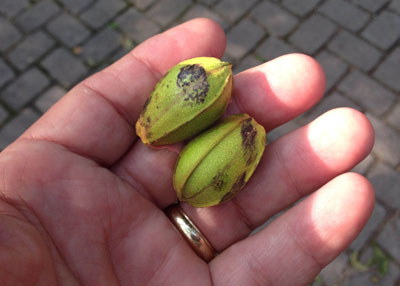From the Sperry Gardens: September 2014
I have seen a couple of tree issues in our landscape this month. Coincidentally, many of the customers of Arborilogical Services of DFW (www.arborilogical.com) must have the same problem. As a help for my radio and Facebook friends — and now for you — Russell Peters, one of their finest certified arborists, sent me a check list of what their people are seeing. Here are some of his notes.

Cedar elms dropping hundreds of small twigs to the ground.
Russell says they’re seeing squirrels do this. He adds that you can fill up a trash bag with the twigs every day, and that it will go on for probably a couple of weeks (should be subsiding by now). He ends by saying, “It does not harm the tree at all.”
Pecan branches hanging quite low and even breaking. (I have limbs hanging down this year, and other years they have been even more threatening to the long-term well being of my trees.) Russell says, “Pecan nuts are getting to the water stage, and the nut load is really significant on some trees. Calls into our office for large broken limbs are increasing to several a day now and will likely continue for another two weeks. Nothing to do at this point except try to select a quality tree company (editorial insert: Arborilogical Services certainly IS one if you’re in DFW) when the trees get pruned, and make sure they are addressing end weight. It is also important that they not only say they will be reducing end weight, but have them explain what they will be doing and where the majority of pruning will likely be taking place. This is probably the biggest mistake most homeowners make when having pecan trees pruned.”
Russell Peters continues, “Properly reducing end weight takes quite a lot longer than just removing deadwood or removing interior growth. The former is consequently more costly. We professional tree companies all sell our labor/time, and a higher cost is associated, in most cases, with a crew spending more time in the tree and actually providing what the tree needs, not what the client thinks they want or what an alleged “arborist” thinks they can sell.
“Removing interior growth does allow more air to move through a tree; however, it also allows much more movement at the ends of large limbs, and that can result in limb failure. Leaving interior secondary and tertiary growth evenly spaced throughout the canopy will absorb and dissipate the wind load, resulting is less limb failure. Studies have shown this.
“The longer you live with large pecans, even trees that have been properly cared for, you will still experience some limb loss from time to time. There are also many large pecans that have had all the secondary and tertiary growth removed in the past by improper pruning. Trying to rehabilitate these trees does take several years, but it can be done.”
Leaves have been stripped of all their green tissues. The veins are left behind, looking like a scouring pad.
Russell Peters says, “Leaf skeletonizer has been sporadic, but it has been bad where it has shown up. Most sites are expressing old damage, as we’re not seeing a lot of active infestations, so generally, there is not much reason to spray at this point unless you’re seeing pests actively working.”

Finally, something that we are definitely seeing (and hearing on our skylights!) right now in and around the Sperry landscape: pecan scab. (I’m sure that Arborilogical Services is also hearing about this one.) It’s a fungus that attacks the shuck of the immature pecans during the summer. Affected pecans drop prematurely (August into early September) with black spots on their husks. The two in my hand in the photo had hit the ground while I was on our driveway. Within a day, each would have turned completely black and watery. They are not usable in any way when this happens.
You must spray to prevent this disease, not to cure it. Apply a labeled fungicide product three or four times beginning in late spring and continuing into early August. Or, do what we do: accept the good pecans that fall in November and tolerate the bad ones we have to sweep up and discard in early September.

